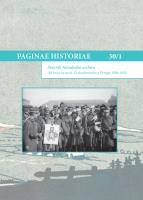Cesta k volbám 1920 a jejich dopad na vnitropolitickou situaci ČSR
The Road to the 1920 Election and Its Impact
Author(s): Peter PopálenýSubject(s): History, Political history, Interwar Period (1920 - 1939)
Published by: Národní archiv
Keywords: parliamentary elections; political parties; parliament; electoral systems
Summary/Abstract: The first election to the Chamber of Deputies of the National Assembly of the Republic of Czechoslovakia in 1920 was a definitive confirmation of the democratic journey started by Czechoslovakia upon its establishment in 1918. Regardless of many economic and social issues the newly formed multinational state had to face, the election took place in compliance with the constitution and progressive, democratic laws. A guarantee of general, equal, direct and secret vote together with an equal position of men and women in the election formed an integral part of the election. Moreover, the system of proportional representation was implemented, allowing real engagement of political parties representing national and opinion minorities in the society. In these respects, all the above attributes ranked the first-republic Czechoslovakia among the most democratic countries, not only on the European continent.The election was held at a time of the post-war economic and social crisis, accompanied by the dissolution of monarchies and foundation of a number of new states searching for their identities and territorial integrity, with Czechoslovakia not being an exception. In the context of the time, the extremely important element of the coming of the communist – Bolshevik ideology must not be ignored. Its destabilizing impact was also present in the Czech lands and Slovakia and caused significant problems among the left-wing political parties. The left, otherwise very strong, was internally confronted with these opinion currents, and the Czechoslovak Social Democratic Labour Party was headed for a definitive division. Another significant issue was the national minorities and their dissenting attitude towards the Czechoslovak Republic, which was weakened in many respects, however, a form of a parallel society emerged, reflected in the party lines. It was not ideology or programme but nationality that became key to voting.The social democrats were the clear winners of the election to the Chamber of Deputies but the success did not mean an end to the overall social crisis, neither the crisis within the party itself. The newly formed government did not last long. The increasing division among the social democrats became a substantially destabilizing element. Thus the election results did not and could not bring a quick end to the crisis; however, it was a tangible manifestation of the power distribution in the society, and a catalyst of the home affairs in many respects. The following steps taken by the political party representatives, together with the international developments, gradually led to stabilization of Czechoslovakia. Many issues that were a part of the pre-election battle in 1920, in particular those concerning minority integration, remained unresolved and kept resurfacing throughout the existence of the First Republic.
Journal: Paginae Historiae
- Issue Year: 30/2022
- Issue No: 1
- Page Range: 162-182
- Page Count: 21
- Language: Czech

